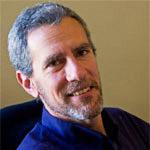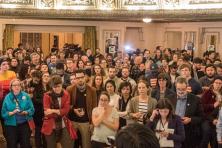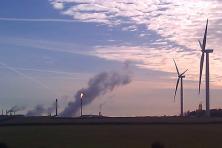Thousands of people poured into the streets – defying restrictions on public gatherings in Paris’ continuing state of emergency – as negotiators wrangled over the final text of the Paris climate agreement last Saturday. One held a sign saying “To change everything, start anywhere.” A beyond-adorable baby’s said: “Nappy change – yes; system change – yes; climate change – no.” A fluttering school of salmon windsocks from Seattle and Bellingham needed no words to say to me “this is the right stream.”
After the November 13 attacks and two weeks of wrangling over obscure text of immense consequence, the demonstrations were a huge release. Public will converged from around the world in Paris, winning progress in the agreement itself and leaving no doubt that people and communities are determined to win much more: climate solutions as big as the problem. The Paris Agreement is an important measure – but a lagging indicator – of that determination.
The broad, strong contingent from the Northwest delivered state and local oomph to our national negotiators – pumping them up with local solutions and domestic resolve, and beating back unconscionable attempts by Senate deniers and opposition presidential candidates to undermine American leadership.
The visual images from these two weeks in Paris were dizzying, inspiring, gorgeous.
But this guy above said it all. He held this pose for at least an hour, while balancing on top of a small post. He didn’t move, barely blinked. After all the hullabaloo – the terrible violence in the run-up to the COP; the frenetic two weeks of diplomatic wrangling; the emotional drain of surviving in the gap between the “aspiration” of climate stabilization (1.5 degrees C) and the commitments in the Paris Agreement (3ish) – his calm, simple, unwavering assertion seemed to say it all. His umbrella too – small and lightweight, you might think... but resolute red.
To “be” climate is the hardest thing of all, since it is so patently beyond the scope of anyone’s effectiveness. And yet there’s nothing else to be, nowhere else to go.
Climate denial persists because we don’t want to go here. Contradicting the science is the least of it; denial has morphed and metastasized, as we experiment with the psychological adaptations needed to preserve sanity while living lives that fan the flames. We compartmentalize. We detach. We disown consequences. It’s what allows President Obama and Secretary Kerry to work their hearts out in an impressive display of American diplomatic will for a strong climate agreement, while toying with a deal to lift the oil export ban – an action that would increase both emissions and the economic power of the climate’s most implacable foe.
If we grasp the overwhelming consequences of climate disruption only dimly, it’s because they are so harsh in the light of our constrained human agency. We doubt we can prevent them; we lack faith in our ability to wield our collective will through public institutions; and – the kicker – we cause these consequences. All of us find forms of darkness to shield this toxic combination of culpability and futility from our full consciousness. It’s hard to carry on otherwise. And so to “be” climate – to seriously own it, without flinching and without going nuts – is the hardest thing.
In a storm of raucous protesters, there was a curious calm around this living picture. He was so still. He balanced so precariously for so long. You had to wait for him to blink to know he was real. Was his expression fierce or sad, focused or blank? He gave no clue. Was he up to something more than the three small words? I wondered…. and then realized, there is nothing more. I’m in Amsterdam now, but for all I know, he’s still there.
There’s so much to say about what happened in Paris: the hot-takes are piling up past the top of the Eiffel Tower already. (As Mo Udall once said, everything has been said, but everyone hasn’t said it yet.) People I admire and respect have very different perspectives. His insistence on holding political reality to the standards of physical reality is one of the many reasons I love Bill McKibben’s perspective. The Guardian, which is revolutionizing climate coverage, has a worthy take here. Anthony Rogers-Wright of Environmental Action has tough truth here. Our own Ben Serrurier (we still claim him, though he's off at graduate school) shares some keen observations here.
Much has been made of the “signal” the Paris Agreement will send to investors. Even the Economist, after sniffing its conk at the negotiations, concluded: "Perhaps the most significant effect of the Paris agreement in the next few years will be the signal it sends to investors: the united governments of the world say that the age of fossil fuels has started drawing to a close."
Let me get some sleep and chew it all over. But I don’t think I’ll come up with any more important takeaway than this guy’s: Je suis climat.
And by saying “Nous sommes climat” (we are climate) – however tentatively – the nations of the world have authored some vital context for each new “Moi aussi!” (Me too!)





